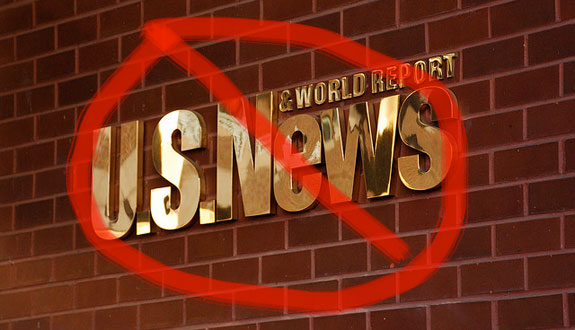More USNWR Law School Ranking Crappery
- by
- Oct 05, 2009
- Law School, Law School Rankings
- Reviewed by: Matt Riley


I was thinking of following Trent’s lead and writing about whatever the hell pops into my mind (number one contender was The Various Firms and Starting Salaries of the Muppets) when I came across this little story this morning. Back in his heyday of being relevant, Trent also wrote about how USNWR can be pretty bullshitty, and today the GW Hatchet reported one instance of how their rankings are actually having a very real and tangible effect.
Most people would agree that George Washington Law is a great school. But how great? In the 2009 USNWR rankings, they dropped from 20th to 28th. An eight-place drop might not matter as much in the third tier or lower, but up at the top it’s pretty huge. According to Senior Associate Dean Greg Maggs: “The thing that I’m worried about most is the current college seniors who are thinking about where to apply. We might be off their radar screen and that might provide a bad year for us this year.” That sucks. Especially because the drop apparently wasn’t due to any change on their part.
For one thing, adjunct professors are counted less than full time professors. As Maggs explains, “It’s a very unfair system, where we have 2,000 students and 480 full-time and part-time faculty and yet we’re told our student-teacher ratio is 16 to one when really it’s five to one.”
But the huge thing, according to Maggs, was USNWR’s new decision to count part-time students as much as full-time students. GW’s LSAT and GPA rankings immediately fell, as did their ranking. Based on a decision made by a magazine, George Washington suddenly looks like a worse choice, even though, as far as I can tell, they didn’t do anything that lowered the quality of the education they provide. Can you really say you’re getting any less of an education because you’re sharing your classes with part-time students who may have lower numbers than you? This could possibly make class sizes larger, so there might be an argument to be made there. But it appears that they’re largely talking about night students, who I imagine are not really sharing the classes with the full time students. If this is the case, I don’t really see how that affects the full-time day students. Up until now, opening your doors to night students with lower numbers was fine; it would be interesting to know why USNWR now decided that this is an undesirable practice.
So what’s GW’s solution? If you’ve got a tumor, you get a scalpel; they’re just going to be taking fewer night students. I imagine this will work. If you take out the lower numbers, your average is going to go up. And, honestly, it is understandable. The sad things is that these rankings, regardless of whether or not they should matter, do matter. Quoted in the Hatchet article is alum Carlos Lucero:
- Of course it’s concerning because it effects the overall reputation of the law school and anything that effects the overall reputation of the law school, whether it’s a perception or reality, nonetheless has a ripple effect throughout the country when you’re a national law school like this. The lesser the reputation of your school is in an aggressively difficult job market, the more difficult it becomes for students to get a job.
So you can’t really blame Maggs and the people who made this decision. If you have a knife to your throat, you shut up and do whatever you’re told. But who wins? GW now has fewer students and less revenue coming in. And all those prospective night students will now have fewer choices for good law schools. But what does USNWR get? Does their having night students really warrant an eight place drop? And, who knows, maybe is it coming from something else, and the dean is just using the night-students as a scapegoat? Not that I think this is the case, but it’s good to consider all the facts. But the facts, as far as I can tell, seem to point to this being pretty unfair.
Search the Blog

Free LSAT Practice Account
Sign up for a free Blueprint LSAT account and get access to a free trial of the Self-Paced Course and a free practice LSAT with a detailed score report, mind-blowing analytics, and explanatory videos.
Learn More
Popular Posts
-
logic games Game Over: LSAC Says Farewell to Logic Games
-
General LSAT Advice How to Get a 180 on the LSAT
-
Entertainment Revisiting Elle's LSAT Journey from Legally Blonde








